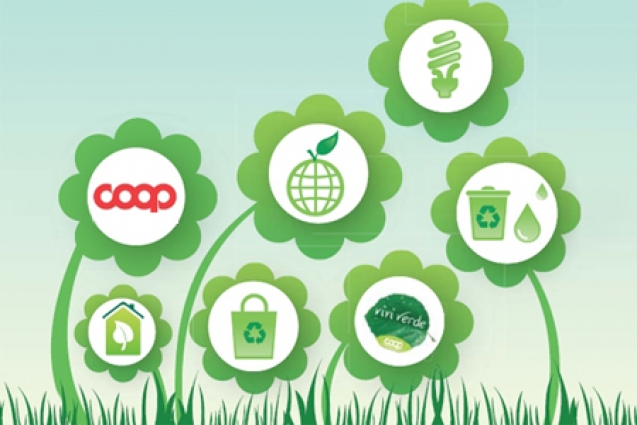Euro Coop’s Contribution to the EU Consultation on Green Paper: “A 2030 framework for climate and energy policies”
02.07.2013 12:25:03

2nd July 2013
Preliminary remarks
Its members, the national consumer co-operatives in 18 European countries, carry out a wealth of initiatives aimed at fulfilling these goals and a snapshot of these can be found on the third report of the project “Climate Change and Consumer Co-operatives: Taking the Challenge forward”, which you can find here.
This position was jointly developed with Cooperatives Europe, of which Euro Coop is a member, also to underline the role that the co-operative model per se can play in achieving a citizen-driven transition towards a more sustainable energy setting.
Questions and answers of the consultation:
4.1. General
- Which lessons from the 2020 framework and the present state of the EU energy system are most important when designing policies for 2030?
Binding targets, when well designed, have achieved significant emission reductions and have promoted the switch to Renewable Energies. This has been demonstrated via the implementation of the renewables directive. Therefore this principle needs to be maintained in the 2030 framework.
Where binding targets to reach the 20-20-20 targets are missing, failure has occurred, as can be evidenced with the 20% energy efficiency target, which so far has failed.
The current ETS system has also failed thereby undermining the market system rationale. A market system can only function when all actors are included and are treated equally. Allowing the use of international certificates, as done by a number of European multinationals, beats that logic. The ETS system therefor needs a credible reform and should be considered only as one potential tool to achieve the 2030 targets, yet with much less relevance as put forward in the 2020 framework.
The 2020 strategy did not consider the importance of local and regional renewable energy initiatives and especially the central role of European citizens - not only as consumers of energy, but as the main actors. Yet citizens have been the driver of the energy transition, in particular via jointly owned schemes, such as renewable energy cooperatives or community-owned schemes. Citizen ownership and co-decision in the energy transition will boost social acceptance but also help to better organize the energy demand, stabilize the internal energy market and reinforce indigenous supply sources.
4.2. Targets
- Which targets for 2030 would be most effective in driving the objectives of climate and energy policy? At what level should they apply (EU, Member States, or sectorial), and to what extent should they be legally binding?
With the evidence of the 20:20:20 framework in mind the 2030 framework should have 3 binding targets at EU level for: energy efficiency (of at least 35%), renewables (minimum of 45% share) and greenhouse gas emissions (minimum of 50% reduction). These EU level targets need to be broken down into 27 individual national level targets ensuring an equal burden-sharing approach.
- Have there been inconsistences in the current 2020 targets and if so how can the coherence of potential 2030 targets be better ensured?
Energy savings and renewable targets need to be defined first with the share of renewables based on the level of the efficiency target. On the basis of this the resulting greenhouse gas target and the allocations for the emissions trading scheme can be calculated, similarly as the national targets under the effort sharing decision.
- Are targets for sub-sectors such as transport, agriculture, industry appropriate and, if so, which ones? For example, is a renewables target necessary for transport, given the targets for CO2 reductions for passenger cars and light commercial vehicles?
Sub-targets are in general not desirable. Regarding the transport sector, emphasis should be placed on technology neutral measures to promote CO2 reductions.
- How can targets reflect better the economic viability and the changing degree of maturity of technologies in the 2030 framework?
Binding targets drive policy decisions and give investment signals. Not having binding targets will give no incentive to efficiency and the switch to renewables. Industry needs long-term stability to develop the necessary technologies in Europe to achieve the set targets.
- How should progress be assessed for other aspects of EU energy policy, such as security of supply, which may not be captured by the headline targets
An in-depth upfront analysis need to be made about existing, planned and potential new sustainable power plant installations, existing and planned infrastructure and interconnection.
4.3. Instruments
- Are changes necessary to other policy instruments and how they interact with one another, including between the EU and national levels?
The EU ETS should be adapted not only to the current renewable and efficiency directives but also to the 2030 targets. Streamlining policies are fundamental. Overlapping targets and a variety of implementation measures water down the effectiveness of each other. For example, the legislation on sustainable consumption and production, transport and logistics and waste should include coherent and harmonised energy and climate change targets.
- How should specific measures at the EU and national level best be defined to optimise cost-efficiency of meeting climate and energy objectives?
National binding targets, derived from EU level targets, will give clear investment signals and clarity on the pathways that need to be taken by national industries.
- How can fragmentation of the internal energy market best be avoided particularly in relation to the need to encourage and mobilise investment?
Fragmentation could be avoided by organizing the demand of energy. Energy cooperatives as well as other local and regional schemes cluster demand together. This is as a step forward towards better governance of the energy market
Decentralized energy production schemes are to be promoted, such as renewable energy cooperatives and community-owned energy schemes. Decentralization will lower the threshold for investments requiring less heavy national and European investments. To mobilize citizen investments, remuneration schemes should be put in place. This will empower business ventures with a bottom-up perspective, thus keeping the monetary sources within the region of origin.
- Which measures could be envisaged to make further energy savings most cost-effectively?
Energy savings should be targeted to focus on citizens, allowing them to manage their own energy. For example, consumer co-operatives have carried out many initiatives to inform and educate consumers about energy efficiency and the benefits of renewables. These efforts should be recognized and further promoted, so as to build consciousness on energy consumption and as a consequence, energy savings. A concrete example is The Co-operative Group’s “Green Schools Revolution” project, i.e. a comprehensive learning resource about the importance of energy savings and of the benefits of renewables prepared by education specialists and available to all UK primary and secondary schools for free. Another meaningful example is represented by the Italian consumer co-operative (Coop Italy)’s “Eco-Courts”. This initiative aims to increase the efficiency of water and energy consumption of the families, besides lowering domestic garbage production and encouraging reuse and recycling. It is addressed both to individual citizens/families and to property managers who manage public spaces within buildings.
4.4. Competitiveness and security of supply
- How can the EU best exploit the development of indigenous conventional and unconventional energy sources within the EU to contribute to reduced energy prices and import dependency?
Complete liberalization was shown not to lead to fair competition. Equality on competition terms should be granted for small and medium companies. Transparency in the distribution of aids and taxes should be shown and supporting mechanisms should help the development of Renewable Energy Sources (RES). Also, “Green choices”, i.e. the possibility to switch to more environmentally-friendly energy suppliers should be easier and not be burdensome for the consumer.
- How can the EU best improve security of energy supply internally by ensuring the full and effective functioning of the internal energy market (e.g. through the development of necessary interconnections), and externally by diversifying energy supply routes?
Decentralized production schemes not only tackle energy poverty and energy loses, but also help to generate a more independent energy market based on indigenous sources and the diversification of supply. Grids interconnection should be tackled in a local way, following a centripetal methodology.
Energy extracted from non-renewable energy sources should not be taken as an option. Shale gas, coal and lignite represent a threat for the development of a long-term stable energy market. It should not be encouraged given the risk of crowding out finance for renewables and undermining GHG reduction targets
4.5. Capacity and distributional aspects
- Are new financing instruments or arrangements required to support the new 2030 framework?
The Intelligent Energy Facility has supported local and regional initiatives and should therefore be strengthened and receive more funding.
About Euro Coop
The national organisations of consumer co-operatives in 18 European countries make up Euro Coop. Founded in 1957, Euro Coop today represents the interests of over 4,500 local and regional co-operatives owned by a total of 30 million consumers across Europe, employing more than 450,000 people and accounting for € 74 billion in annual turnover.
For more information, please contact:
Rosita Zilli, Senior Policy Adviser
Tel: +32-(0)2-285-00-72
Fax: +32-2-231-07-57
Latest Sustainability Policy news

EU Commission Presents New Five-Year Consumer Policy Roadmap
The EU Commission has unveiled its new five-year roadmap for consumer policy, outlining...

Euro Coop Co-Signs Joint Position Paper on Omnibus I
Euro Coop, together with CNA , Legacoop and ECCO , has released a joint position paper in...

Euro Coop is seeking an Erasmus+ Policy Intern
Euro Coop – The European Community of Consumer Co-operatives is seeking a Policy Intern...
Latest Sustainability Policy stories

UN Recognises Cooperatives with Decadal International Year
Euro Coop warmly welcomes the United Nations General Assembly’s historic resolution to...

Skupina COOP Wins at the European Commerce Awards 2025
Euro Coop warmly congratulates Skupina COOP , our member from the Czech Republic, for winning...

FNCC Showcases Consumer Cooperation at GSEF 2025 in Bordeaux
Euro Coop member FNCC proudly participated in the Global Social Economy Forum (GSEF) 2025 ,...

